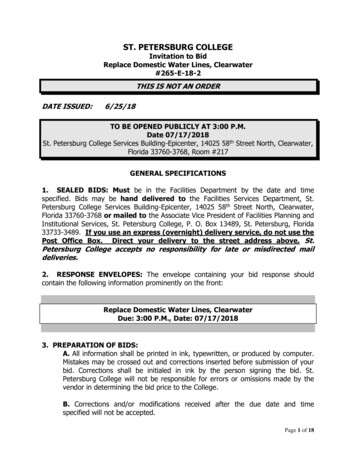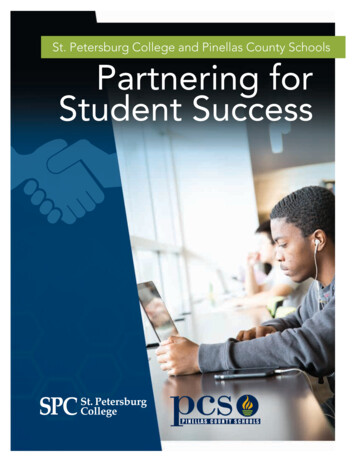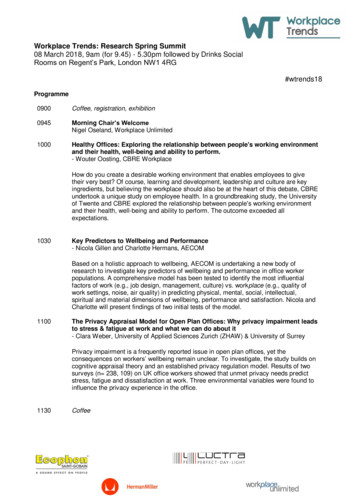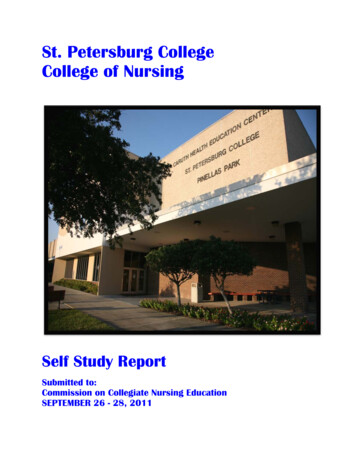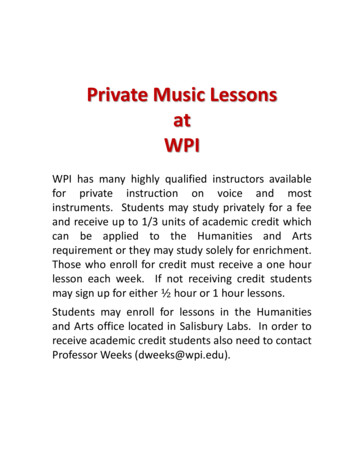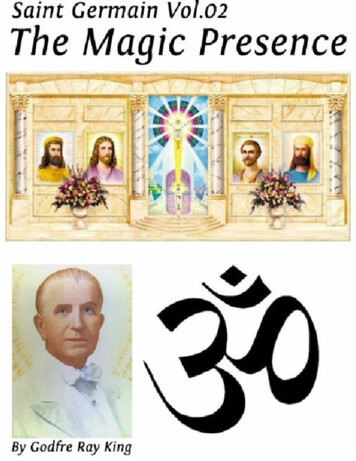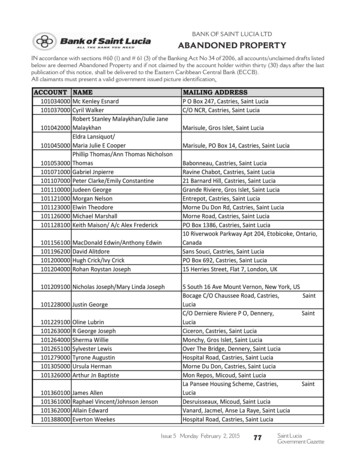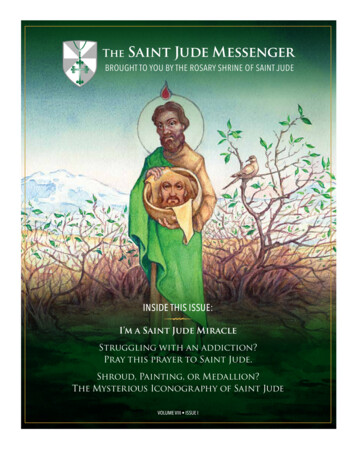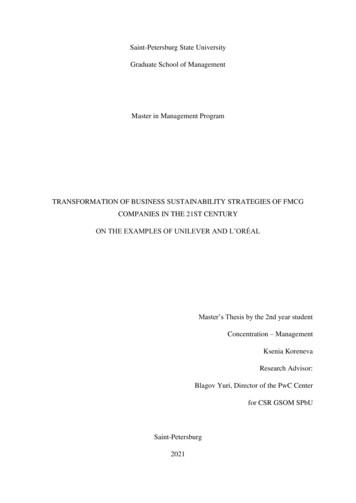
Transcription
Saint-Petersburg State UniversityGraduate School of ManagementMaster in Management ProgramTRANSFORMATION OF BUSINESS SUSTAINABILITY STRATEGIES OF FMCGCOMPANIES IN THE 21ST CENTURYON THE EXAMPLES OF UNILEVER AND L’ORÉALMaster’s Thesis by the 2nd year studentConcentration – ManagementKsenia KorenevaResearch Advisor:Blagov Yuri, Director of the PwC Centerfor CSR GSOM SPbUSaint-Petersburg2021
ЗАЯВЛЕНИЕ О САМОСТОЯТЕЛЬНОМ ХАРАКТЕРЕ ВЫПОЛНЕНИЯВЫПУСКНОЙ КВАЛИФИКАЦИОННОЙ РАБОТЫЯ, Коренева Ксения Дмитриевна, студентка второго курса магистратуры направления«Менеджмент», заявляю, что в моей магистерской диссертации на тему« Трансформация стратегий устойчивости бизнеса FMCG-компаний в 21 веке напримере компаний Юнилевер и Лореаль», представленной в службу обеспеченияпрограмм магистратуры для последующей передачи в нную комиссию для публичной защиты, не содержится элементов плагиата.Все прямые заимствования из печатных и электронных источников, а также иззащищенных ранее выпускных квалификационных работ, кандидатских и докторскихдиссертаций имеют соответствующие ссылки.Мне известно содержание п. 9.7.1 Правил обучения по основным образовательнымпрограммам высшего и среднего профессионального образования в СПбГУ о том, что«ВКР выполняется индивидуально каждым студентом под руководством назначенногоему научного руководителя», и п. 51 Устава федерального о образовательного учреждения высшего образования «СанктПетербургский государственный университет» о том, что «студент подлежитотчислению из Санкт-Петербургского университета за представление курсовой иливыпускной квалификационной работы, выполненной другим лицом (лицами)».(Подпись студента)07.07.2021 (Дата)2
STATEMENT ABOUT THE INDEPENDENT CHARACTER OFTHE MASTER THESISI, Ksenia Koreneva, (second) year master student, MIM program «Management», state thatmy master thesis on the topic« Transformation of business sustainability strategies of FMCG companies in the 21stcentury on the examples of Unilever and L’Oréal », which is presented to the Master Officeto be submitted to the Official Defense Committee for the public defense, does not containany elements of plagiarism.All direct borrowings from printed and electronic sources, as well as from master theses, PhDand doctorate theses which were defended earlier, have appropriate references.I am aware that according to paragraph 9.7.1. of Guidelines for instruction in majorcurriculum programs of higher and secondary professional education at St.PetersburgUniversity «A master thesis must be completed by each of the degree candidates individuallyunder the supervision of his or her advisor», and according to paragraph 51 of Charter of theFederal State Institution of Higher Education Saint-Petersburg State University «a studentcan be expelled from St.Petersburg University for submitting of the course or graduationqualification work developed by other person (persons)».(Student’s signature)07.07.2021 (Date)3
АННОТАЦИЯАвторКоренева Ксения ДмитриевнаНазвание ВКРТрансформация стратегий устойчивости бизнесаFMCG-компаний в 21 веке на примере компанийЮнилевер и ЛореальОбразовательная ление подготовкиMaster in ManagementГод2019-2021Научный руководительБлагов Юрий ЕвгеньевичОписание цели, задач иРеальная проблема для исследования заключается восновных результатовтом, что в 21 веке компании FMCG должны внедрятьновые стратегии устойчивости бизнеса или улучшатьсуществующие. Это необходимо, потому что всовременном мире существует множество вызовов ипроблем, связанных с устойчивым развитием. Итак,цель исследования - разработать рекомендации потрансформации стратегий устойчивости бизнесаFMCG-компаний. Ключевые цели исследования проанализировать трансформацию стратегийустойчивого развития на микро- и макроуровнях.Также важно посотрудничать с FMCG-компаниями ипонять их мотивацию в реализации �. Следующая цель - разработатьключевые рекомендации по трансформациистратегии устойчивости бизнеса FMCG-компаний.Основными результатами исследования являетсясписок рекомендаций, основанный на опытеключевых лидеров в сфере FMCG - компанийЮнилевер и Лореаль.Ключевые словаСтратегии устойчивости бизнеса, FMCG компании,трансформация стратегии, Юнилевер, Лореаль4
ABSTRACTMaster Student's NameKoreneva Ksenia DmitrievnaMaster Thesis TitleTransformation of business sustainability strategies ofFMCG companies in the 21st century on the examples ofUnilever and L’OréalEducational ProgramManagementMain field of studyMaster in ManagementYear2019-2021Academic Advisor’s NameBlagov Yuri EvgenievichDescription of the goal, tasksThe real-life problem for the research is that in the 21stand main resultscentury FMCG companies must implement new businesssustainability strategies or to improve existing ones. Thisis needed because in the modern world there are a lot ofchallenges and problems, connected with sustainability.So, the purpose of the paper is to createrecommendations for the transformation of businesssustainability strategies of FMCG companies. Key goalsof the research are to understand the sustainabledevelopment strategies transformation on micro-leveland macro-levels. Also it is important to cooperate withFMCG companies and understand their motivationregarding sustainable business strategies implementation.The next goal is to elaborate key recommendations forFMCG companies’ business sustainability strategiestransformation. The main results of the study are the listof recommendations, based on the experience of keyleaders in FMCG sphere – Unilever and L’Oréalcompanies.KeywordsBusiness sustainability strategies, transformation of thestrategy, FMCG, Unilever, L’Oréal5
TABLE OF CONTENTSINTRODUCTION . .90.1. Relevance of the study .90.2. Research gap and goal .90.3. Research questions . .10CHAPTER 1. THEORETICAL RESEARCH ON THE BUSINESS SUSTAINABILITYSTRATEGIES . .121.1. Macro-level changes that affect business sustainability strategies . .121.2. Micro-level changes that affect business sustainability strategies .14CHAPTER 2. RESEARCH METHODOLOGY FOR THE TRANSFORMATION OFBUSINESS SUSTAINABILITY STRATEGIES’ ANALYSIS .262.1. Methodology for empirical study . 262.2. Data collection .262.3. Expected results .27CHAPTER 3. RESULTS OF THE ANALYSIS AND DISCUSSIONS WITHUNILEVER .293.1. Results of the data analysis of the Unilever .293.2. Sustainable plan recommendations, based on Unilever experience .45CHAPTER 4. RESULTS OF THE ANALYSIS AND DISCUSSIONS WITH L’OREAL .474.1. Results of the data analysis of the L’Oréal .474.2. Sustainable plan recommendations, based on L’Oréal experience .53CHAPTER 5. DISCUSSIONS AND CONCLUSION .565.1. Key recommendations . .565.2. Theoretical contribution .576
5.3. Managerial implications 575.4. Limitations and future research directions 58REFERENCES . .59APPENDICES 637
LIST OF TABLESTable 1. Comparison of key theories about sustainable business strategies .23-25Table 2. Unilever Sustainable Plan 2010-2020, main targets and results 30-41Table 3. Unilever analysis with the help of main theories .45Table 4. L’Oréal, Sharing beauty with all plan, main targets and results 47-49Table 5. L’Oréal analysis with the help of main theories .53LIST OF APPENDICESAppendix 1. The global goals for sustainable development/ Lamach M. How our companyconnected our strategy to sustainability goals/ Harvard Business Review, October 2017 63Appendix 2. The pyramid of plastic waste management/ A circular solution to plastic wastes.BCG/ July 2019 63Appendix 3. Mechanical recycling loop/ A circular solution to plastic wastes. BCG/ July2019/ URL: lution-to-Plastic-WasteJuly-2019 tcm9-223960.pdf.64Appendix 4: The Business sustainability typology with key characteristics and shifts/ Dyllick,Th. and Muff, K. (2016), “Clarifying the meaning of sustainable business: introducing atypology from business-as-usual to true business sustainability”, Organization &Environment, Vol. 29 No. 2, pp. 156–174. .64Appendix 5. The Triple Layered Business Model Canvas/ Joyce A., Raquin R.L. The triplelayered business model canvas: a tool to design more sustainable business models/ Journal ofCleaner production, 2016 65Appendix 6. Sustainable business model archetypes/ Bocken N.M.P, Short S.W., Rana P.,Evans S. A literature and practice review to develop sustainable business model archetypes./Journal of Cleaner Production, 2014 65Appendix 7. Interview with Communications & Sustainable Business Manager in UnileverRussia, Ukraine and Belarus, Anastasia Novak .66-698
INTRODUCTION0.1. Relevance of the studyThe topic of the master thesis is “Transformation of business sustainability strategiesof FMCG companies in the 21st century on the examples of Unilever and L’Oréal”.Business sustainability strategies are crucial for different industries. They influence oneconomic, environmental and social aspects of the business. Business sustainability strategy isan integration of economic, environmental and social aims into company’s goals, with the aimto create a long-term value for the company, stakeholders and society1.In our research we have decided to focus mainly on FMCG industry and its companies— businesses that manufacture and distribute consume goods fast and on relatively low price.Important examples of FMCG companies are Unilever, P&G, Nestle, Coca-Cola. They are thehugest companies in the industry, that are among the first ones who have implemented businesssustainability strategies. So, the topic is relevant for FMCG companies, that can use its resultsfor the transformation of their existing sustainable strategies. For our research we will focus onUnilever — leader in FMCG sphere, that is present in more than 190 countries in the world2.Also, we will analyze L’Oréal — one of the biggest FMCG companies, that focuses on beautyproducts3.0.2. Research gap and goalFor our analysis we investigated theoretical and practical papers, that can be dividedinto two main groups. Papers about micro-changes, that influence business sustainabilitychanges and papers about macro-changes, that affect these changes. Many of these papers aredevoted to key theories of business sustainability strategies and their implementation.Meanwhile, there is a lack of studies regarding companies’ motivation and need to implementor transform their business sustainability strategies. Also, there are no research about theinfluence of Covid-19 pandemic on business sustainability strategies. What is more, we usedofficial information of FMCG companies in general and Unilever and L’Oréal in particular.1Thomas B. Long, (2019) Sustainable Business Strategy. In Leal Filho, W., Azul, A.M., Brandli, L., Özuyar,P.G., Wall, T. (Eds.) Encyclopedia of the UN Sustainable Development Goals: Decent Work and EconomicGrowth. Springer, UK.2Unilever/ official websiteURL: https://www.unilever.com/3L’oreal/ official websiteURL: https://www.lorealparisusa.com/9
The real-life problem is that in the 21st century FMCG companies must implement newbusiness sustainability strategies or to improve existing ones. This is needed because in themodern world there are a lot of challenges and problems, connected with sustainability. Theseproblems can be solved only with the help of businesses, society and government. This reallife problem is not fully covered in the existing researches.Based on theoretical analysis of the topic, we were able to identify the research gap. Inthe literature there are many information regarding key business sustainability theories, butthere is a lack of understanding of companies’ motivation. How companies make plan of theirbusiness sustainability strategies transformation? Which factors are the most important forthem? How did Covid-19 affect these strategies?The purpose of the paper is to create recommendations for the transformation ofbusiness sustainability strategies of FMCG companies. Key recommendations for sustainablestrategies implementation will be based on the analysis of lessons, reasons, recommendationsof Unilever and L’Oréal companies. So, the object of the study is FMCG company. The subjectof the study is the business sustainability strategies in the 21st century.We have set four goals in order to achieve the main purpose of the research. The firstone is to analyze main papers regarding the business sustainability strategies transformation onmacro-level — state, society, world. The second is to understand the sustainable developmentstrategies transformation on micro-level. The third is to cooperate with FMCG companies —leaders in the industry — and understand their motivation regarding sustainable businessstrategies implementation. What is the level of their business sustainability strategies? Whatare the key drivers for these strategies? The forth goal is to elaborate key recommendationsfor FMCG companies’ business sustainability strategies transformation, based on companyleaders experience (L’Oréal and Unilever).0.3. Research questions and research strategyFrom the research problem formulation, we can pose research questions. There are twoof them for now:1) Why do companiesimplementtheirbusinesssustainability strategiestransformation?2) What drives companies to transform their business sustainability strategies?10
This paper will consist of five chapters. The first chapter is dedicated to the theoreticalresearch — analysis of macro and micro-level changes that affect business sustainabilitystrategies. The second is devoted to the research methodology, that we used in my research.The third part is about results of the analysis and key recommendations for Unilever company.The fourth one is about our results of the analysis and key outcomes for L’Oréal company. Thelast chapter is devoted to discussions and conclusion of the paper.The research has practical importance because it can be used by FMCG companies fortheir business sustainability strategies’ creation and transformation. What is more, businesssustainability strategies are relevant for society, because these strategies create additional socialvalue. That is why, by examining existing business sustainability strategies and by creating aspecific recommendation for their implementation, this topic could be beneficial for society.11
CHAPTER 1. THEORETICAL RESEARCH ON THE BUSINESS SUSTAINABILITYSTRATEGIES1.1. Macro-level changes that affect business sustainability strategiesIn order to understand a concept of business sustainability strategy, it is vital to analyzechanges on macro- and micro-level that influence on business sustainability strategy. Firstly,we would like to present main ideas of the macro-level analysis.Let’s start our analysis with the Brundtland Report—a report of the WorldCommission on Environment and Development, called “Our common future”4. The main goalof this paper was to propose multilateralism and interdependence of different nations in theirsearch for sustainable development. Our Common Future has placed environmental issuesfirmly on the political agenda. This paper was a result of “900-day” cooperation betweendifferent nations.The main idea of the report was to strengthen international cooperation on environmentand development, create new forms of cooperation, raise level of sustainable issues’understanding. The Commission has focused on food security, energy, areas of population,human settlements etc. Human resource development in the opinion of the Brundtland Reportauthors was essential for formulation of sustainable strategies. Also, it has acknowledged thelimits of the environment to the economic growth. The Report claimed that poverty reducessustainability and accelerates environmental pressures.What is more, the key contributions of Our Common Future to the concept ofsustainable development include the recognition that the many crises facing the planet areelements of a single crisis of the whole world.Bansal (2019)5 has summarized main ideas about the sustainable development in the21st century. He says that sustainable development aspires for intra- and inter-generationalequity. The need of future generations cannot longer be assured due to rapid wealth creationand its influence on natural environment. While we are facing the exciting technologicalrevolutions, the wealth, created by these revolutions, is distributed among fewer number ofpeople.4WCED [World Commission on Environment and Development] (1987). Our common future. New York, NY:Oxford University Press.5Bansal, P. (2019), “Sustainable development in an age of disruption”, Academy of Management Discoveries,Vol. 5 No. 1, pp.8–12.12
Author believes that sustainable development requires multi-level, multi-disciplinaryand dynamic analysis. Technologies will have dual influence on our population in the 21stcentury. On the one hand, they will deal with some difficult environmental issues such asclimate change, hunger, poverty etc. On the other hand, the will displace many jobs, createeven more poverty and cause a big amount of energy consumption.Bansal claims that in order to face macro disruption, researches in management spheremust introduce inter-disciplinary dialogue. Sustainable development requires knowledge ofmany professionals. It boosts circular economy and need circular cooperation. Business alsoface massive system changes. So, sustainable researchers must reevaluate and reexamine themeaning of sustainable development, its classification and ways to find a consensus solutionfor sustainable problems.Lamach (2017)6 has introduced crucial research, that covers the connection ofsustainable business strategies and sustainable development goals (SDGs) of the UnitedNations organization. These goals were set in 2015 by the UN General Assembly and areintended to be achieved by 2030. These goals are “no poverty”, “no hunger”, “good health andwell-being”, “quality education”, “gender equality” and others7. Authors note that only 2% ofcompanies are successful in achieving sustainable goals, whereas this connection is essentialfor sustainable business strategies. These goals could identify and lead companies to thecreation of these strategies.That is why, Lamach provides some advices for companies who want to follow andimplement sustainable goals:1. Companies should rely on people, who understand these goals,2. It is essential to make sustainable goals personal for companies’ staff,3. Companies must track, measure and recognize sustainable goals.6Lamach M. How our company connected our strategy to sustainability goals/ Harvard Business Review,October 20177Appendix 1. The global goals for sustainable development/ Lamach M. How our company connected ourstrategy to sustainability goals/ Harvard Business Review, October 201713
These advices could be used for our research in addition to sustainability theories. Wecould elaborate scale for SDGs implementation by companies to understand their commitmentto these goals.Griggs, Stafford-Smith, Gaffney (2013)8 have also analyzed sustainable developmentgoals (SDGs), that follows the Millennium development goals (MDGs), elaborated by theUnited Nations. Authors claim that with the rise of human population by 9 billion by 2050,definition of sustainable development must be changed and adopted to the existing and futurechallenges. SDGs must include the security of people and the planet itself.Authors propose to create a new unified framework for the sustainable goals anddevelopment. They propose to combine SDGs and MDGs and create six target for 2030. Thedefinition of the sustainable development, that was formulated in the Brundtland CommissionReport, must be changed. It can be redefined in the following way: “development that meetsthe needs of the present while safeguarding Earth’s life-support system, on which the welfareof current and future generations depends”. From this new definition, authors propose six newSDGs: thriving lives and livelihoods, sustainable food security, sustainable water security,universal clean energy, healthy and productive ecosystems, and governance for sustainablesocieties.Griggs, Stafford-Smith, Gaffney believe that international governance must bestrengthen in order to achieve proposed six goals. Examples of these changes could be:«binding agreements on climate change, by halting the loss of biodiversity and ecosystemservices and by addressing other sustainability concerns».1.2. Micro-level changes that affect business sustainability strategiesNow, we are moving to the analysis of changes on micro-level that influence businesssustainability strategies. It is mainly a level of the firms decision-making.Porter and Kramer (2011)9 have identified a concept of shared value, which focuses onthe connections between social and economic progress. Even huge companies such as Google,IBM, Walmart and others have begun to pay attention to the creation of shared value. Authorsfound out three main ways, by how companies can create shared value:8Griggs, D., Stafford-Smith, M., Gaffney, O. et al. (2013), “Sustainable development goals for people andplanet”, Nature, Vol. 495, pp.305–3079Porter M.E.,Kramer M.R. The big idea - Creating shared value/ Harvard business review, Jan-Feb 2011, p. 627714
by reconceiving products and markets, by redefining productivity in the value chain, by enabling local cluster development.Using these ways, companies will create new innovation, which will be beneficial forcompanies themselves and society.Porter and Kramer have concluded that not all kinds of profit are equal. Profits,involving social value, create a positive cycle of company and community prosperity. Also, inthe article it is stated that corporate social value must supersede corporate social responsibility,when we are talking about companies’ investments. While corporate social responsibilityfocuses on reputation and company’s brand, corporate social value is essential for company’sprofitability and competitive position. In conclusion, it is stated that by creating social value,company creates economic value.Now, let’s move to the sustainability analysis on real life examples. We believe thatreports, conducted by consulting agencies and organizations are essential for our research.So, in 2019 BCG company has created a report regarding circular solutions to plasticwastes10. In this paper there is the pyramid of plastic waste management11. It shows that exceptof reducing of wastes, reuse of plastics is the best alternative. Whereas, leaking of plastic wasteinto the environment is the worst scenario. As for the disposal of wastes in landfills, it is notvery preferable option. All in all, these results of analysis could be implemented into theelaboration of sustainable strategy plan, because various stakeholders are interested in wastemanagement.BCG has created a mechanical recycling loop12, that provides an efficient business casefor various companies and had significant social and environmental advantages. The mainprincipal of the recycling loop is that wastes are recycled into secondary raw materials withoutthe change of the basic structure of this materials. As a result, this loop will reduce an amountof virgin plastics and will drive greater circularity.10A circular solution to plastic wastes. BCG/ July 2019URL: lution-to-Plastic-Waste-July-2019 tcm9-223960.pdf11Appendix 2. The pyramid of plastic waste management/ A circular solution to plastic wastes. BCG/ July r-Solution-to-Plastic-Waste-July-2019 tcm9-223960.pdf12IBidM15
McKinsey company has created a report regarding new trends in packaging13. Thereare five main trends, that will change the rules in the packaging industry by 2030. They willrequire more innovations and agility from companies to deal with the market competition. Theyare:1. E-commerce everywhere2. Changing consumer trends3. Retail margin compression4. Increasing pressure on sustainability5. Digitalization of packagingThe first trend is “e-commerce everywhere”. With the development of Internet and itsaccessibility, companies must create packaging designs that will attract customer online. Thiswill increase packaging requirements. The second is “changing consumer trends”. People willrequire more personal, convenient, affordable and health products and services. The third is“retail margin compression”. It occurs when the costs to make a product or deliver a servicerise faster than the sales price of the product or service. Margin compression will raise forFMCG and retailers. The next trend is “increasing pressure on sustainability”. Sustainabilitywill increase at every step of the value chains. The last one is “digitalization of packaging”. Itwill lower costs and gain a competitive edge with consumers. All in all, these trends must betaken into account for our further research.United Nations environmental program (UNEP) has created a roadmap forsustainability with the analysis of single-use plastics14. This material is cheap and easy to makeand use. But the wastes from single-use plastic are enormous. Only with the help of cooperationof society, government and business we are able to reduce these wastes.13No ordinary disruption - winning with the new model in packaging 2030. McKinsey & Company/ May 2019URL:https://www.mckinsey.com/ -use plastics: a roadmap for sustainability/ UNEP, 2018 00.11822/25496/singleUsePlastic sustainability.pdf?sequence 1&isAllowed y16
Combining examples of this cooperation on national and sub-national levels, UNEP hasintroduced 10 steps roadmap for sustainability. It is crucial for governments that are willing toimprove current measures regarding this sphere. These 10 steps are:1. Find out the most problematic types of single-use plastic by conducting anassessment of different types of plastic2. Consider the best actions to solve the problem, taking into account the country’ssocio-economic peculiarities3. Examine the potential on social, economic and environmental levels of the preferredshort-listed instruments4. Identify key stakeholders to ensure cooperation5. Raise public awareness about the harm caused by single-used plastics6. Promote alternatives of single-use plastic7. Provide incentives to industry by introducing tax reduction and special conditions tothis industry8. Use revenues collected from taxes on single-use plastics in order to provide publicgoods9. Allocate roles and responsibilities of this process and enforce chosen measureseffectively10. Monitor and adjust the chosen measures and update the public on progress.In conclusion, it is vital to note that these steps could be used by any government in theworld, adopting it by the social, cultural and economic peculiarities of its company.Lubin and Esty (2010)15 believe that nowadays sustainability is an emerging trend onthe mega-level. These megatrends require business to adapt fast and to be involved in order tosucceed. It is vital to note that over the past 10 years’ environmental issues have influence a lotbusinesses’ capacity to create value for customers. These issues also influence products’quality.15Lubin D.A., Esty D.C. The sustainable imperative/ Harvard Business Review, May 201017
Authors have concluded that to elaborate successful sustainable strategies, companiesshould make shifts in 5 important areas. In these areas companies implement not tactical, butstrategic and systematic changes. The first area is an elevation of leadership, which is essentialfor the implementation of sustainability. The second one is a systemization of methods andmodels. The third is an alignment of strategy and development, that must go in cooperationwith each other. The last ones are an integration of management and a systemization ofreporting and communication. All these areas allow companies to build their sustainablebusiness plan.Lubin and Esty have also pointed out some rules in order to implement this sustainableplan. These rules are the following: “do old things in new ways”, “do new things in new ways”,“transform core business” and “new business model creation and differentiation”. Authors alsogave examples of companies, who have followed these rules and succeeded. They are CocaCola and Walmart.Authors have also created a system of companies’ division into four groups, dependingon their sustainability value creation and execution capabilities. The first group is called“losers”. These are companies, whose value is created from waste, cost, risk reduction and theyhave a capacity for tactical execution. The second group is “defenders”. Their value is alsocreated from waste, cost or risk reduction, while they have capacity for strategic execution. Thethird group is “dreamers”. These companies create value from product and business modeltransformation and have capacity for tactical execution. The last group is cal
«Transformation of business sustainability strategies of FMCG companies in the 21st century on the examples of Unilever and LOréal », which is presented to the Master Office to be submitted to the Official Defense Committee for the public defense, does not contain any elements of plagiarism.
